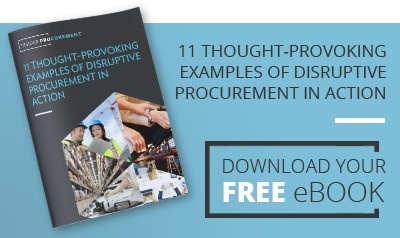Everyone knows that for a business or function to be successful they need to hire great people. Unfortunately, the vast majority of managers and executives will also know the pain and angst created from a bad hire. From having someone in the business who didn’t fit the culture, couldn’t deliver and/or negatively impacted on those around them.

David K. Williams and Mary Michelle Scott in May 2012’s issue of Harvard Business Review notes that that impact of a bad hire is huge both financial and emotionally;
“Career Builder reports more than two-thirds of employers were affected by a bad hire last year, according to AOL Jobs. Of nearly 2,700 employers surveyed, 41% estimate a single bad hire cost $25,000; a quarter estimate a bad choice cost $50,000 or more — not to mention the demoralizing effect of the issue on other employees and on the new hire.”
Procurement is a key role in most businesses
In procurement, the stakes are potentially even higher as people are having a bigger impact than ever before. With increasingly lean organisations, more and more of the final end product is being delivered by the supply chain making the supplier selection process pivotal to the performance of many businesses. According to one of the leading procurement pre-qualification (pqq) software providers Achilles, “most organisations' procurement spend is more than 50 per cent of total business revenue”.
Historically procurement has at best been a corporate backwater and at worst a lifeless desert. Where life could be found, it was all too often inhabited by people with a penchant for purchase order numbers and with little connection to business or what it was trying to achieve.
Over the last 25 years, this has changed dramatically but the echo of procurement’s past is still felt in many organisations in the form of a dearth of talent.
Attracting talent into the profession at an early stage is still a struggle.
The best raw talent is often attracted by the bright lights of marketing, the cut and thrust of sales or the wealth of progression in finance. Who ever heard of a teenager saying “when I grow up I want to be a procurement manager?”
That’s not to say there aren’t great procurement people out there; there most certainly are (present company included!), but the supply of these people is severely limited:
- It's usually not the first choice profession for young adults.
- Many find their way into procurement through another functional or operational role.
- Good procurement people get promoted into managing the procurement team rather than working the role directly.
This leaves a relatively small gene pool that is therefore tough to fish in – especially if you are looking for A-graders.
Great Procurement People: How do you find them?
It's beyond the scope of this post to explore the general characteristics of great people. For that; check out Tristan Boutros’ (co-author of The Process Improvement Handbook) excellent article on 15 perfect employee traits.But if you're hiring procurement people, the 5-point checklist below and our guide to the 7 habits of successful procurement teams will help you avoid costly mistakes.
1. Fish in a bigger pond
 It is common practice for businesses to look for people in their own industry when hiring but as we have explored, the talent pool for procurement is rather shallow, so it makes sense to branch out and consider candidates with transferable skills and knowledge from outside your industry.
It is common practice for businesses to look for people in their own industry when hiring but as we have explored, the talent pool for procurement is rather shallow, so it makes sense to branch out and consider candidates with transferable skills and knowledge from outside your industry.
This dramatically improves your chances of finding the right person. For example; a high street retailer looking for a property category manager might consider someone from another business with a broad real estate base e.g. facilities management, hospitality or high street banking. Those people could bring a different dimension to the job that is beneficial to your business.
2. External over internal focus
Whilst great procurement requires an excellent understanding of the business and the supplier market, at Insider Procurement we have found that those with a tendency to an external focus generally perform better. As obvious as it sounds, this is something most businesses don’t recognise. Failing to hire procurement people with a natural interest in trends, developments and networking outside their own business and industry can allow a "steady state" consensus to emerge. Thinking across the team becomes limited to the sum of the experiences and knowledge of the internal stakeholder group. Key trends are missed and competitors, suppliers and disruptors are able to take advantage.
It can be difficult to ascertain an external focus during the CV phase but is usually easy to detect at interview. Open questions such as “tell me about a typical week in your current role” provide excellent clues to their natural style.
3. Specialist knowledge in your high impact categories
We’ve probably all heard it said that procurement is a process and you can buy anything if you apply the process. We agree with this statement, but also recognise that having specialist knowledge is the difference between good and great. It is unrealistic for most businesses to have buyers or category managers with a specialist in all their spend areas so generalists are very useful but it makes sense to hire experience in categories which really matter to you. Even if you pay a bit more; the experience, network and insight will facilitate faster delivery and allow you to navigate the ‘watch outs’ the knowledge of which is the product of gritty experience. For a handful of organisations where their market is hyper specialised, this will limit their pool, but for most, the industry cross-cutting nature of products/services should keep this in check.
4. Track record over talk
Unlike the disclaimer on stocks and shares, past performance is a good predictor of performance – especially in procurement where the ability to leverage one’s network and rapidly adapt to a changing situation is a daily requirement. On that basis track record should be an intrinsic part of your search and selection criteria. Use it to rapidly shortlist applicants for interview and ensure that it is explored thoroughly during any face to face interaction.
One of the issues in assessing track record in procurement is confidentiality. Naturally, applicants will be reluctant to share details for legal and ethical reasons, making it hard to assess whether the record is real, embellished or entirely imagined. The best approach to this is the "Threat of a Reference Check" or TORC, exemplified in Bradford D Smart’s book; "Topgrading: How to Hire, Coach and Keep A Players". TORC is an amazingly effective technique for outing bullshit. Simply go through the candidates track record asking detailed questions including the spelling of the names of former managers. This direct approach rapidly causes the weaker candidates (those who are over-hyping their achievements/role) to drop out, leaving a better pool of candidates to choose from. This simple but effective approach reduces time wasting on C grade candidates and allows you to spend time with those with real potential.

5. Prioritisation skills
Most interview processes are usually an initial “chat” followed perhaps by a case study. This approach works fine but very few case study scenarios address prioritisation. For people in procurement, the ability to prioritise is a key task. Procurement is often a target rich environment (there are lots of potential opportunities), so picking the right things to work on is an essential ingredient to success. If your organisation has a suite of pre-employment tests,then we would encourage you to access these as most will have some provision for assessing prioritisation skills. If not, then for a relatively low fee of a few hundred pounds one of the many providers in this space can provide you with a short but insightful test for candidates. A small fee to pay given the £000’s lost by hiring the wrong person!
Find out more about how our approach to disruptive procurement can help deliver significant EBITDA improvement to your business by downloading our ebook, or by viewing our website in more detail.

